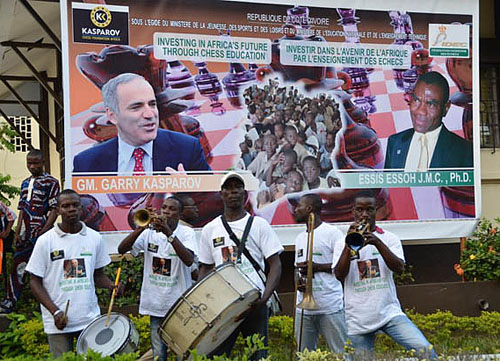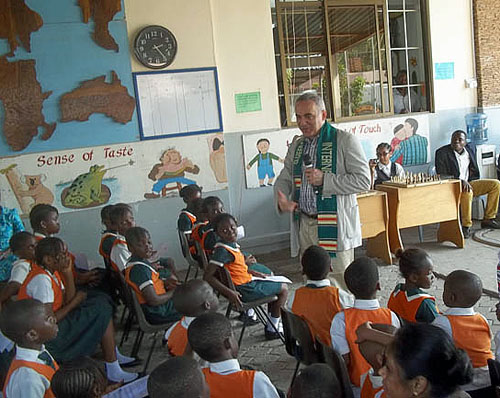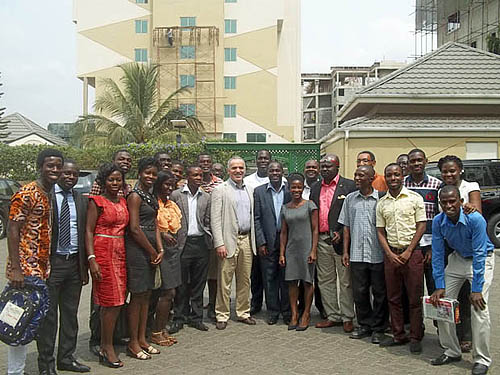West African feds support Kasparov2014
Former World Champion Garry Kasparov has been busy with his campaign for FIDE President having recently finished an Asian tour and an African tour. The Asian tour occurred during the World Chess Championship in November and the latter covered a number of countries in Africa to augment the seven-country African tour last summer (included Kenya, Uganda, Rwanda, Malawi, Zimbabwe, Zambia and South Africa). Kasparov visited Senegal, Ivory Coast, Ghana and Nigeria and was well-received.
Kasparov posed an interesting question about the future of African chess… “When will we see the first African world chess champion? If we begin big training push now?” Interestingly enough, Africa (West Africa in particular) has had a champion in another board game. The region boasts some of the world’s strongest draughts players… most notably francophone countries such as Ivory Coast and Senegal. In fact, Senegal has even produced the legendary Baba Sy, who was 1963-64 World Champion. If this is the case, there is no reason that West Africa cannot produce a vibrant chess culture.
When will we see the first African world chess champion? If we begin big training push now?
~A question Kasparov posed to each country on the African tour
Kasparov expressed optimism after his trip and was seemingly impressed at the reception. Despite the success, his visit ignited controversy. The presidents of three federations (Nigeria, Senegal, Ghana) have written a declaration as a sign of support for “Kasparov2014” while condemning what they see as “Good Old Way Of Doing Business” from Kirsan Ilyumzhinov. The declaration was in a rather sharp style and rebuked the pattern of campaign politics. It read,
Over the course of the last several weeks, we have been approached, like many of our neighboring African chess federations, and requested to either host or participate in “visits to our countries” by Mr. Kirsan Ilyumzhinov, President of FIDE since November 1995. Almost everywhere, such visits are being officially presented as the occasion to launch “Chess in Schools Programs” in the countries being visited. In actual fact, these visits are being used to exert significant political and financial pressures on the local chess federation Presidents to cast their votes for Mr. Ilyumzhinov, who will be running for his fifth term as FIDE President in the 2014 FIDE elections.
As members of a new generation of African leaders and managers, we believe that these campaign strategies and tactics are illustrative of the “Good Old Way Of Doing Business” (GOWODB) with Africa’s governments, and with its public, private and civil society organizations. We believe in particular that the GOWODB is based on a concept of “Elections in Africa” which is not only insulting and demeaning for all Africans, but also totally out of touch with the vibrant reality of our continent which has engaged in an irreversible process of political transformation and economic development.
This declaration could have tremendous repercussions on the election and Ilyumzhinov’s campaign staff will certainly scramble to right the ship. In previous years, Ilyumzhinov has had some success in Africa despite a fierce battle against Bessel Kok in 2006 and Anatoly Karpov in 2010. However, it appears that Kasparov is taking a more measured approach and has many qualities missing in the previous candidates.

Kasparov welcomed in the Ivory Coast, a country traditionally strong in draughts. Joel Atse won the blitz gold medal in draughts at the World Mind Sport Games in China. Perhaps there is room for chess!

Kasparov addresses students at Queen’s International School in Ghana.

Members of the Ghana Chess Association
After the tour, three West Africans released the aforementioned declaration (dated 17 February 2014) showing support for Garry Kasparov. Signatories to the declaration were: Mr. Adeyemi OLALEKAN, President – Nigeria Chess Federation, Dr. Essoh Jean Mathieu Claude ESSIS, President – Federation Ivoirienne des Echecs, Mr. George Kweku ARKO-DADZIE, President – Ghana Chess Association. This show of solidarity may set the tone of an election where stakes are increasingly high.

3 Comments